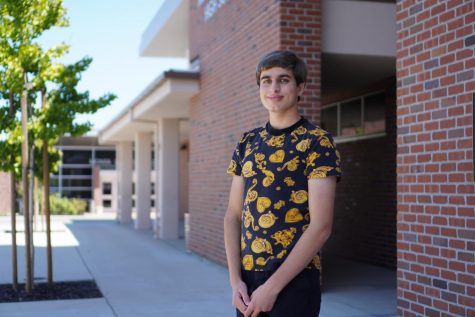Sexual assault assembly at MVHS
Examining the virtual SAFER Choices Assembly assembly
June 1, 2021
“I’ve been doing this [giving presentations about sexual assault] for 30 years and I literally do it all over the world, for the U.S. military, in schools and in universities,” founder of Center for Respect Mike Domitrz said. “The most powerful stories are typically afterwards when I hear from students. I’ll give you an example that just happened over the weekend: I got a Facebook message from somebody saying, ‘I saw you a few years ago at my college campus and at that time, I was in a really abusive, unhealthy relationship. When I saw your program I recognized what was wrong about that.’ She got out of that relationship, and because of what she learned in our program, she knew what she wanted in a healthy relationship, and now she’s married in a wonderful relationship and she was sharing [with me] how much she still uses the skills today. That to me is why we do this work.”Due to events related to sexual assault that occurred during the summer, MVHS and other Fremont Union High School District schools decided to find a speaker to speak to students about sexual assault. The speaker they hired, Mike Domitrz, covered many topics surrounding sexual assault at a school-wide assembly titled “SAFER Choices.” MVHS principal, Ben Clausnitzer, believes that sexaul assault should be a topic of discussion in highschools.“I believe in a comprehensive approach to high school, which really means that students are exiting high school as citizens of a community,” Clausnitzer said. “What do we want students to exit with? Yes, there’s the knowledge of certain core content: math, English, social science, science, world language, those graduation level requirements. We believe in students getting involved in the arts, electives and finding a passion and their home in school. This is expanding for us at MVHS and the Fremont Union High School District. There are also other important conversations that we have not had in past years that we need to start having. Those have included things like social emotional learning, anti racism and this particular one on the issues of positive relationships, sexual violence and this world of consent.”
In many ways, the reasons for which FUHSD hired Domitrz to speak were similar to Domitrz’s goals during his presentation. In addition to these objectives, he also attempted to teach long-term, constructive habits and skills for relationships.
“To stop sexual assault from happening in the first place is a major goal of everything we’re doing,” Domitrz said. “The second half is to teach people positive how-to skills for healthy relationships and respecting boundaries. We want this [relationships] to be a wonderful experience in people’s lives, so we want to give them skills that can help create healthy, thriving relationships.”
According to Clausnitzer and Domitrz, the results of the seminar were overwhelmingly positive and fulfilled the goals that both of them had in mind. These positive results were shown in a survey taken after the presentation in which 98% of students said they strongly agreed or agreed to more likely stop someone from using alcohol to sexually assault another person, and 97% of students said they agreed or strongly agreed to tell a loved one they would be there for them if they were ever sexually assaulted. Despite this clear progress, Domitrz acknowledges that although people might inherently know the right way to interact with others in sexual situations, they don’t necessarily act as such.
“So we’ve raised awareness, which is awesome, but we need behavior to match it, and it’s not,” Domitrz said. “I asked if the drunk scene where somebody’s trying to get a drunk person alone in a sexual situation still happening, and the students said a lot, which means we know the right answers, but people are not doing the right thing. We need them to line up with each other, and that’s the journey we still have to make.”
For Clausnitzer, approaching the point where people’s actions begin to change starts with the kind of conversation Domitrz brought to MVHS by recognizing the strangeness of the scenarios that people so often find themselves in.
“It’s one of these conversations that people are kind of like, ‘Is it OK to have, is it not OK to have?’” Clausnitzer said. “There’s this stigma around talking about sex in society or in certain cultures. I feel like Mike, our presenter, did this really well in terms of talking about it almost in reverse, in terms of, ‘So you’re telling me you’re just going to go for it and you’re not going to ask, you’re not going to give them a choice?’ Think about how creepy and awkward that really is, when you say it that way.”
Beyond the statistics from the post-assembly survey, many students, including junior Seoeun Kim, were happy to see MVHS being more proactive about educating on topics like sexual assault.
“One of the most important ways that we can prevent sexual assault or anything of that matter from happening [is by educating people] and I think it is really cool that our school was able to bring somebody on for that,” Kim said.
Both Kim and Domitrz recognize the necessity of having open conversations about sexual assault. Along with having these discussions, Domitrz finds that speaking about sexual assault with students earlier in life leads students to having healthier sexual interactions.
“I have never in my life met someone who said, ‘You know what, I didn’t need this till now,’” Domitrz said. “It never happens. What always happens when I meet university students, when I work with militaries, is they say, ‘I wish I had gotten this sooner, it would have saved a lot of horrible situations from happening. It would have helped me make better choices. Why didn’t we get this in middle school, in high school, when these relationships and what we’re learning about our relationships is all beginning.’ That’s why it’s vital that we are doing this in middle schools and high schools because that’s where relationships begin and that’s where people set their standards. We want to create healthy positive standards for everybody.”

















